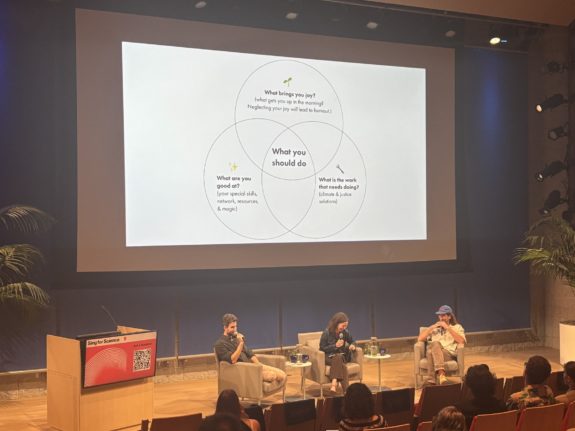On Friday, September 26th, Columbia Climate School hosted AJR’s Adam Met for a NYC Climate Week Event at The Forum. This event was recorded to become an episode of Met’s podcast Sing for Science.
As an opera singer and a biology major, when I saw the event title “Sing for Science”, I was immediately intrigued. Despite listening to some AJR in my tweenage years, I knew little about Adam Met’s climate advocacy work, but was interested in learning more. I was equally excited to hear from Alexis Abramson, the Dean of Columbia’s Climate School.
Admittedly, I arrived at the event a little late (waking up before nine on a Friday is hard), but upon entering the room, I was instantly engrossed. The first thing I heard was Adam Met exclaiming that we were in the “decade of implementation.” This was not an expression I was familiar with, and luckily, he went on to clarify. Met explained that a significant amount of valuable climate research has been conducted in the past few decades, and now is the time to implement the strategies we have identified. This is not to say that there isn’t more science to do. Rather, it is time to take actionable steps using the knowledge we have. Abramson agreed and talked excitedly about projects students at the Climate School are working on.
During the event, there was a lot of discussion about the importance of finding common ground. Met told the audience that while researching for his recent book, Amplify: How to Use the Power of Connection to Engage, Take Action, and Build a Better World, he talked to a prominent conservative news anchor in an attempt to find common ground with someone whose opinions were radically different than his.
Met recounted the nearly two hours of conversation that took place, where they disagreed on absolutely everything. The conversation pivoted to climate change and led to a discussion on natural gas. There, they finally found a small piece of common ground. Met stressed that finding common ground was absolutely essential to make unconventional allies. And making these allies is necessary in the fight against climate change.
Along the same lines, Met and Abramson mused on how to get people to care about climate change, an issue that can feel outside the scope of their lives. Met acknowledged that fighting climate change is not usually an issue people are considering in their day-to-day lives. He emphasized the importance of getting people concerned about the effects of climate change that directly impact their lives.
One example he gave was of a mother he talked to who worried about the faulty diesel school buses in her children’s school district. The solution to this problem was advocating for replacing the diesel buses with new electric ones. Although this woman’s first priority was not the positive impact these electric buses would have on our climate, her problem was solved with a climate-conscious solution. Met connected this story to the idea that everything is a climate issue, even those that don’t necessarily appear as such.
The next question the duo answered was about the integration of technology and nature. This time, Abramson took the lead by explaining a concept called geoengineering. Geoengineering involves using technology to intervene in Earth’s climate system to prevent further degradation. Although Abramson expressed excitement about further studies of these methods, she cautioned that they are extreme measures. She stressed that geoengineering should not be employed without years and years of research, if at all.
The final topic Met and Abramson discussed is one we as a society cannot seem to escape: artificial intelligence. This question proves somewhat divisive between the speakers. Abramson pronounced that AI will make it insurmountably easier to perform data analytics in order to find solutions for specific situations. Met said that while this may be true, he is hesitant to see AI as a saving grace and is conscious of its environmental impacts.
Although the speakers disagreed on the importance of AI in the fight against climate change, they found common ground in one final thing. We must keep looking for the positives.

We live in a world where bad news is endlessly visible. From NYT notifications, to Instagram reels, to X posts, sometimes the sheer amount of bad news can feel genuinely suffocating. However, as hard as it may be, we need to refocus on the positives. Take a look at all the incredible climate work being done at the local and state levels. Find ways to help the environment that bring you joy and make use of your unique skillset. Seek out friends who encourage you to fight for what you believe in. And remember that you do not need to “work in climate” to help save it; advocacy is what you make of it.
We must all keep singing for science, in ways that work for us and bring us joy. And most importantly, we must keep singing together.
Images via Bwog Staff


 0 Comments
0 Comments